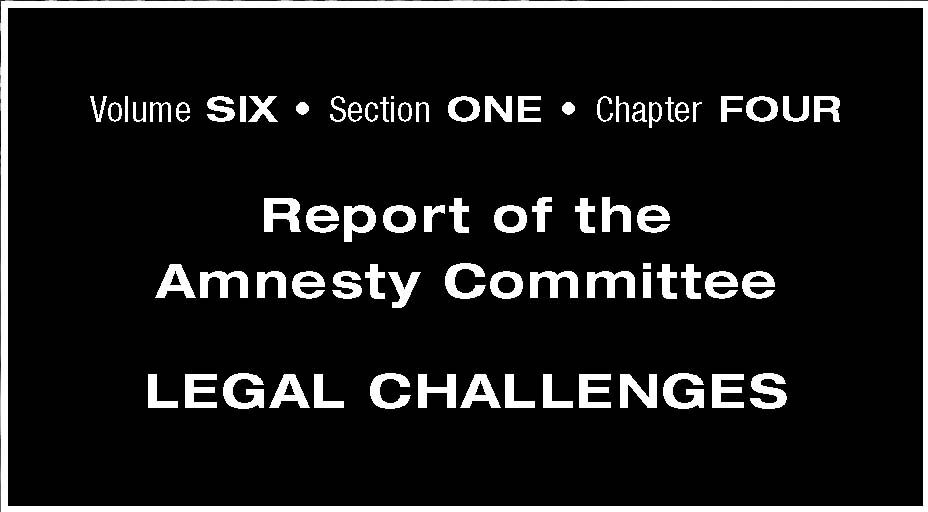 |
News | Sport | TV | Radio | Education | TV Licenses | Contact Us |
 |
News | Sport | TV | Radio | Education | TV Licenses | Contact Us |
TRC Final ReportPage Number (Original) 54 Paragraph Numbers 1 to 11 Volume 6 Section 1 Chapter 4 Subsection 1  Volume SIX Section ONE Chapter FOUR Legal Challenges■ INTRODUCTION1. On 29 October 1998, the Truth and Reconciliation Commission (the Commission) submitted its Final Report to President Mandela. It is a matter of public record that this historic occasion almost failed to take place due to the threat of two legal challenges which, had they succeeded, would have prevented the Commission’s Report from being published at this time. Those who instigated these two court actions were the African National Congress (ANC) and former State President Frederick Willem de Klerk. 2. After submitting its Report to the President, the Commission and its Commissioners were placed in suspension pending the completion of the work of the Amnesty Committee (the Committee), which was eventually dissolved on 31 May 2001. This chapter supplements Chapter Seven of Volume One of the Final Report (‘Legal Challenges’), and covers the period from October 1998 until dissolution of the Commission. 3. Subsequent to November 1998, the Commission was subjected to further legal challenges, mainly against the decisions of the Committee in respect of various amnesty applications. In addition, several matters that had been initiated before October 1998 were finalised during this period. These included complaints to the Public Protector by the Inkatha Freedom Party (IFP) and by certain generals of the former South African Defence Force (SADF).4 5 4. The IFP also launched an application in the High Court with the aim of compelling the Commission to provide all the information and evidence it possessed relating to the findings made against the IFP in the Commission’s Final Report. This matter is dealt with below. 45 Reported on in Volume One, p p. 1 9 6 – 7 .LEGAL CHALLENGES TO THE PUBLICATION OF THE COMMISSION’S REPORTAfrican National Congress465. During the early hours of the morning of 29 October 1998 – the date of the scheduled handover of the Commission’s Report to the President in Pretoria – the ANC launched an urgent application to the High Court for an interdict restraining the Commission from publishing any portion of its Final Report that implicated the ANC in gross violations of human rights before the Commission had considered certain written submissions it had received from the ANC on 19 October 1998. The ANC’s submissions were made in response to the contemplated findings annexed to the Commission’s notice in terms of section 30(2) of the Promotion of National Unity and Reconciliation Act No. 34 of 1995 (the Act).4 7 6. The ANC’s submissions were largely critical of the Commission’s competence, integrity and bona fides in respect of the findings on the ANC. The ANC was especially concerned in view of the fact that the struggle for liberation against the unjust system of apartheid was in itself morally and legally justifiable in terms of international law. 7. It is necessary to understand that the Commission’s mandate to investigate and report on the commission of gross violations of human rights required it to cut across political lines and that the Commission was, furthermore, required to conduct its investigations in an objective and transparent manner. Thus, in addition to investigating the former government and its various structures, the Commission also analysed the role of the liberation movements during the mandate period. 8. The Commission also made a distinction between human rights violations committed: firstly, by the armed combatants of the liberation movements in the course of the armed struggle; secondly, against their own members outside South Africa and, thirdly, by their supporters during the 1980s and after the unbanning of the organisations concerned on 2 February 1990. 9. The Commission based its conclusions and findings on the ANC on a wide range of information and evidence it obtained from: a statements made by those who alleged they had been the victims of gross violations of human rights at the hands of the ANC; b amnesty applications by ANC members and supporters in respect of acts they had committed, which could have resulted in the perpetration of gross violations of human rights; and c the ANC itself in its detailed submissions to the Commission and from its own Commissions of Inquiry into human rights violations, namely the Stewart Report and the Motsuenyane and Skweyiya Commission Reports. 10. The Commission’s findings that led to the ANC being held morally and politically responsible for the commission of gross violations of human rights pertained l a rgely to the deaths and physical injuries sustained by unarmed civilians. These, the ANC had itself admitted, could be attributed to two main causes: either poor reconnaissance, faulty intelligence, faulty equipment, infiltration by the security forces, misinterpretation of policy by their cadres and anger on the part of individual members of MK, or the ‘blurring of lines’ between civilian and military targets during the 1980s. 11. As a result of the information placed before it, the Commission found the ANC to be responsible for a range of gross human rights violations arising out of unplanned operations; the bombing of public buildings, restaurants, hotels and bars; the landmine campaign in the northern and north-eastern parts of South Africa; the killing of individual enemies, defectors and spies; operations of uncertain status; the conflict with the IFP; violations committed by supporters in the context of a ‘people’s war’ fostered by the ANC, and the severe ill-treatment , torture and killing of ANC members outside of South Africa. |